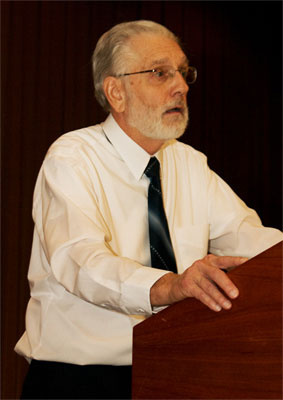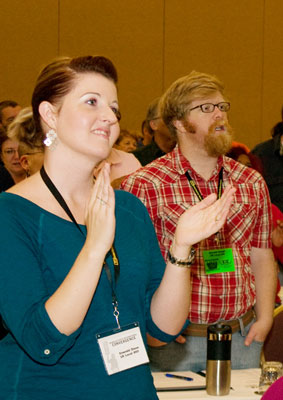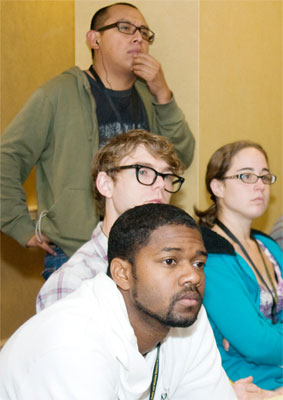
UE General President John Hovis addresses the 72nd UE National Convention.
UE's 72nd National Convention kicked off Sunday morning, September 25, with a keynote address by General President John Hovis. President Hovis reviewed the political and economic situation facing working people and highlighted accomplishments of UE locals in the two years since our last convention. Hovis, who is not seeking reelection and will retire this fall after 24 years as UE's president, also reflected on the union's history and future. UE has gone through many dramatic changes in its 75 year history, said Hovis, but "through it all UE's basic founding principles have been staunchly maintained." Hovis advised the delegates to continue to make whatever changes may be necessary in the future to protect UE and move it forward, but in the process to "preserve and protect the basic principles UE was founded on - democracy and rank-and-file control. They are just as important today as they were in 1936."
Delegates were welcomed to convention's opening session by Eastern Region President Andrew Dinkelaker, who also showed an inspiring video he had produced that captures UE's fighting spirit, past and present. Megan Elk, daughter of UE International Representative Gene Elk, performed the National Anthem. Elaine Purkey, West Virginia labor singer and songwriter, performed some classic union songs as well as her own compositions, and led the delegates in the labor anthem "Solidarity Forever." Father Jack O'Malley, longtime Pittsburgh activist and labor priest, delivered an invocation that was a call for social justice as well as a prayer for a successful convention.
Secretary-Treasurer Bruce Klipple read the convention call and reviewed the schedule of events, as well as assignments of delegates to various convention committees. After posing for the official convention photo, which was taken by Local 618 retiree and professional photographer Ron Flowers, delegates adjourned. Sunday afternoon and evening were devoted to meetings of convention committees - resolutions, constitution, organizing, publicity and education, and policy action - in which the delegates painstakingly prepared reports, resolutions and other actions to be discussed and acted on by the full convention later in the week.
MONDAY MORNING SESSION

Monday morning's session began the consideration of convention resolutions. Members of the resolutions committee presented the first resolution - "Collective Bargaining" - after which several delegates rose from the floor to speak, including Roger Zaczyk, Local 506; Ray Pompano, Local 243; Mary Steward-Flowers, Local 618; and Ray Greenwood, Local 170.
Congressman Mike Doyle (D-Pittsburgh) addressed the delegates. Doyle, whose record on labor concerns as well as matters of war and peace places him close to UE on the issues, said he supports President Obama, but expressed strong criticism of the president for giving in too much to extremist Republicans. "How do you compromise with someone who wants to turn Medicare into a voucher, privatize Social Security, and destroy decent-paying jobs?" Doyle asked. He said the president's two biggest mistakes were agreeing to extend the Bush tax cuts for the rich while getting very little in return, and the so-called "debt-ceiling deal" earlier this summer. Doyle was the only member of Congress from Pennsylvania to vote against that agreement, which he said will result in more cuts that will hurt the people he represents. Doyle also criticized job-destroying "free trade" deals.
Following Congressman Doyle's address, the session continued with discussion of the resolution "Collective Bargaining for Public Employees. The resolution was read and introduced by Wilma Nedrick of Local 160 and Sherry Filiatreault, Local 222, both members of the Resolutions Committee. Kari Thompson of Local 896, Iowa, told delegates that the bargaining rights of public employees are under attack even in Iowa, where public employees are denied the right to strike and unions are weakened by a state "right-to-work" (for less) law. An anti-labor bill was barely stopped by a two-seat Democratic majority in the Iowa senate, but now one of the Democrats has sold out by taking a job with the Republican governor, and that seat will now be filled in a special election that could have great consequences. She also noted that the 2012 Democratic Convention will be held in North Carolina - a state that bans public employee bargaining - and we should use the occasion to bring these issues to the national stage.

Angaza Laughinghouse of North Carolina Local 150 said he's proud that UE has made the rights of public employees in the South a key issue and raised it during the Wisconsin struggle. He also described his local's Mental Health Workers' Bill of Rights Campaign. Connecticut public workers are also under attack, said Marie Lausch of Local 222, and that's all the more reason we support our brothers and sisters in Locals 150, 160 and 170, to raise the rights of all public employees.
More than a million Ohioans signed a petition to overturn union-busting Senate Bill 5, reported Nina Williams of Local 799, which represents public school workers in Delaware, Ohio. Voters will decide on November 8, and Williams is hopeful that the referendum will restore bargaining rights. "We need to make another Wisconsin, another Cairo, Egypt," said Armando Robles, Local 1110, as we fight to make the right to collective bargaining a basic human right.
Even the Bible says the worker is entitled to a fair wage, said James Hill of Local 1177, who expressed his pride in the fight UE has conducted for Renzenberger workers, warehouse workers and public employees. Also speaking on the resolution were Brian Barrington, Local 1421; Ray Greenwood, Local 170; and Jim Wrenn, Local 150. The delegates unanimously adopted the resolution.
President Hovis then introduced Stephanie Bloomingdale, secretary-treasurer of the Wisconsin AFL-CIO. With UE's long fighting history, "It was not surprising to see UE there from the very beginning," she said, and she knows that UE members slept in the capitol building in Madison during the worker occupation. The labor movement was born in fire, she said, recounting the heroic battles to win the eight-hour day and to build the industrial unions of the CIO in the 1930s. "Brothers and sisters, we are at a crossroads. It is now our time to do that for ourselves and our children."
The Republicans want to turn back the clock to the 19th century, when workers had no rights and there were the very rich at the top, and then the rest of us. "No governor has the right to take away our union - not Scott Walker in Wisconsin, not Kasich in Ohio, not Rick Snyder in Michigan, not Christie in New Jersey, not Corbett in Pennsylvania," she said. "Scott Walker didn't know what he started when he declared war against unions. He didn't know private sector workers would stand up in solidarity." After the long occupation of the capitol, rallies in small towns across Wisconsin, and the recall of two Republican state senators, Scott Walker knows now, she said. "He knows he will be recalled."
Sister Bloomingdale concluded, "We will fight back and recall every politician who stands in our way. We will take it to the streets. We will take it to the ballot box. We will fight back and we will win." The delegates gave her a standing ovation.
Becky Dawes, president of Local 893, said that as a result of developments in Wisconsin and Iowa, for the first time in her 28 years in the union, "I'm scared to death." The slim margin of Democrats in the Iowa legislature that stopped anti-labor legislation in the last session is now on the line in a special election in a majority-Republican district.
Resolutions Committee Chair Andrew Dinkelaker called on Wilma Nedrick, Local 160, and Sherry Filiatreault, Local 222, who read the resolution "Stop Privatiization." David Betsworth, Local 893, thanked the committee for an "outstanding" resolution. He said that privatization is to public workers what plant closings are to manufacturing workers, and called on all UE members to stand together to defend each others' jobs.
In Connecticut public workers are losing jobs to "regionalization" as well as privatization, but Local 222 has been aggressively fighting back, said President Marie Lausch. The foremost anti-privatization right now in North Carolina is in the Department of Transportation, said Local 150 President Angaza Laughinghouse. Workers in the Delaware, Ohio public schools organized into UE 12 years ago because of the threat of privatization said Nina Williams, Local 799, and they're glad they did. Local 170 has won some victories in its fight against West Virginia's attempt to privatize information technology jobs, said Chris Wolford, but "We have to stay vigilant."
Also speaking in support of the resolution were Armando Robles, Local 1110, Phil Dedera, Local 1177, and Antwon Gibson, Local 610. Delegates adopted the resolution.
Resolutions Committee members Kathie Nelson (Local 613) and Barrett Gough (Local 896) read the resolution "Fight Workplace Closings." Randy Edwards of Local 1187 described UE's courageous fight that defeated plant closing and union busting at Load King in Elk Point, South Dakota, reinstating the union workers, union, and contract. Angaza Laughinghouse proposed an amendment on the threatened cuts to postal worker jobs, which was approved. Armando Robles offered an amendment to place demands on Obama "and future administrations." That was also approved.
Peter Knowlton, Northeast Region President, spoke passionately about Local 204's unsuccessful year-long fight to keep Haskon from closing in Taunton, Mass. In retrospect, the union should have immediately occupied the plant as Republic workers did. "This is the only union that fights plant closings and sometimes stops plant closings," he said.
Marie Lausch, Local 222, said it was "heartbreaking" at our last convention to say goodbye to the last of our GE Lighting locals, as GE has been getting out of the incandescent lighting business to instead sell compact fluorescent bulbs that it makes in China. Ray Pompano, Local 243, spoke of the personal devastation suffered by victims of plant closings, including divorces and suicides. He remembers the loss of Local 209 in Bridgeport, Connecticut in the late 1980s, when Westinghouse moved those jobs to Puerto Rico.
John Hovis then called up Director of Organization Bob Kingsley to describe the plans for the lunchtime march and rally. Pittsburgh labor singer Anne Feeney entertained delegates as they prepared to leave for the march. The convention then recessed to the march.
The convention continues through Thursday, September 29.
A number of events preceded the official opening of the convention. The union's General Executive Board met on Thursday, September 22. Friday and Saturday, Sept. 23-24, featured meetings of UE Young Activists, as well as young activists from some of our allied unions in Japan, Mexico, Canada, India and France, in the union's first International Young Activist Convergence. On Saturday each of UE's three regions conducted meetings of their own. All of these events were held at Pittsburgh's Wyndham Grand Hotel, a few steps from UE's national office.
